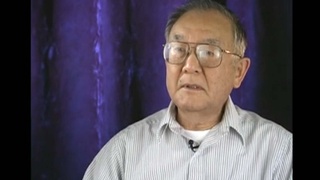Interviews
What to Do Next
Well, I think it was kind of interesting, in the discussion group right now -- the small group discussions -- I think that we really talked a great deal about, "What are we going to do after this?" And you know, everybody seemed to be so concerned about that. I mean, are we going to just sit back and rest and think, "Well, gee, we won this great victory and so now we're all finished, let's just retire and forget about the rest of the world, the rest of our concerns," and that really concerns me. And that's why I'm hoping that there's more to this legacy than what we have so far.
Date: September 11, 1997
Location: California, US
Interviewer: Becky Fukuda
Contributed by: Denshō: The Japanese American Legacy Project.
Explore More Videos




Evolving History
(1929 - 2014) One of the earliest proponents behind the redress movement.

Japanese Americans are more aware of their Hapa identity
(b. 1965) filmmaker and artist






Support from the Japanese American community
(b.1971) Professional figure skater and Olympic gold medalist.

Heightened awareness of identity as a Japanese American
(b. 1955) Lawyer

Reasons for conformity and competitiveness in Gardena, California
(b. 1946) Lawyer

Role of the redress movement in helping Nisei to open up about their wartime experiences
(b. 1946) Lawyer

